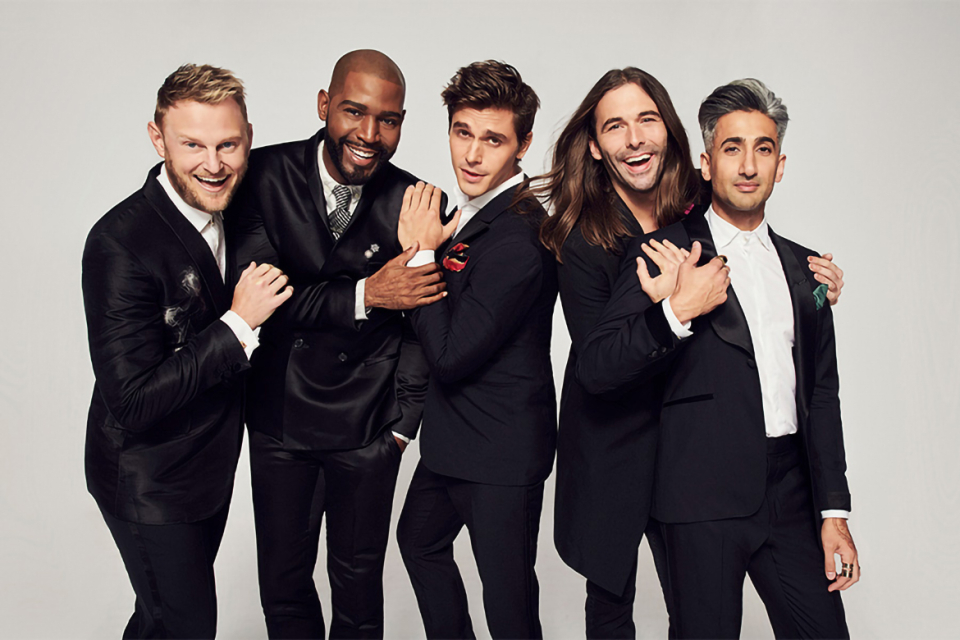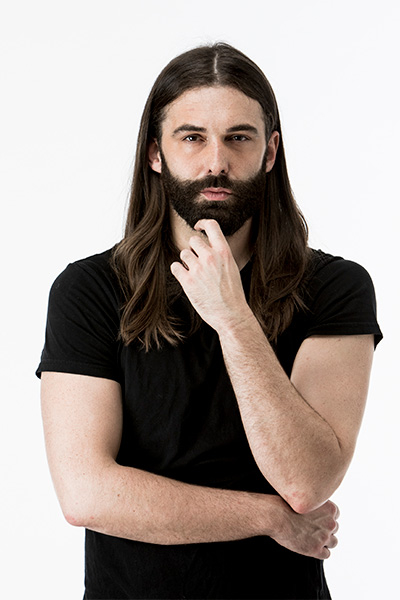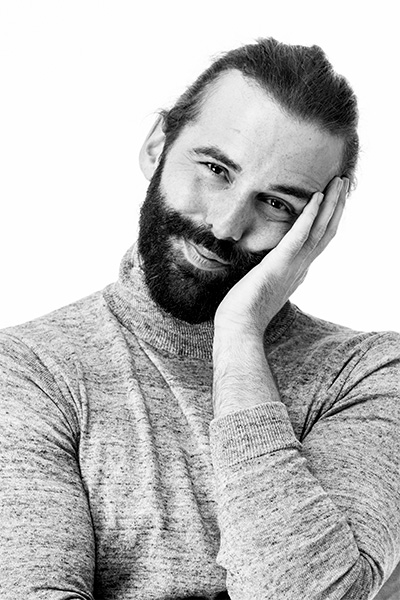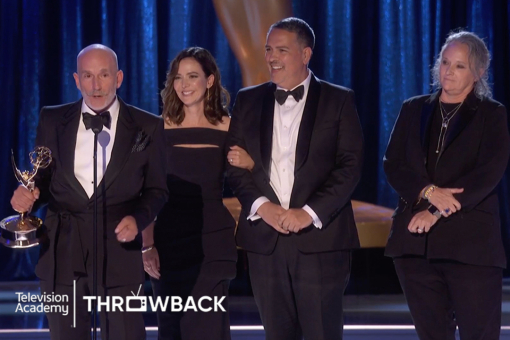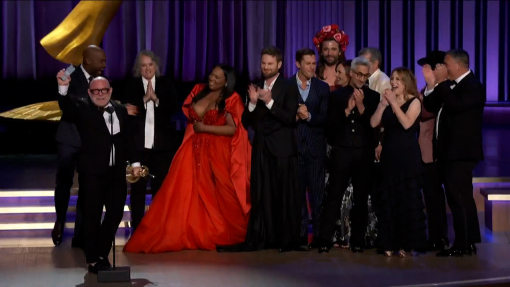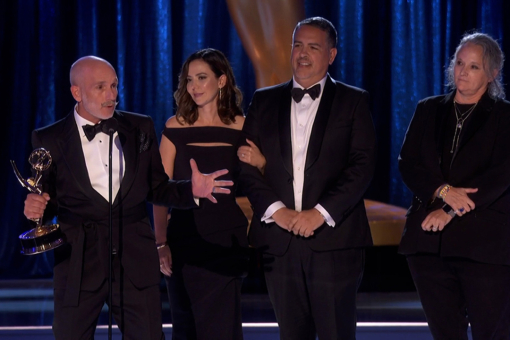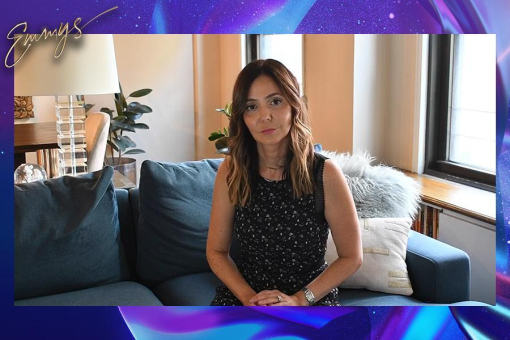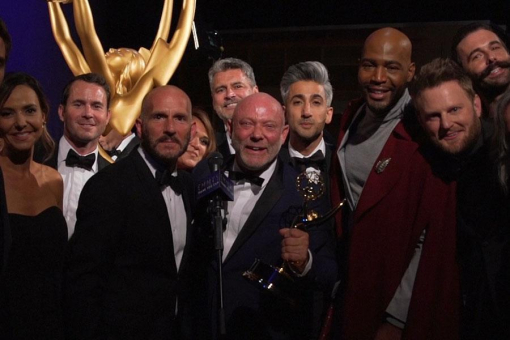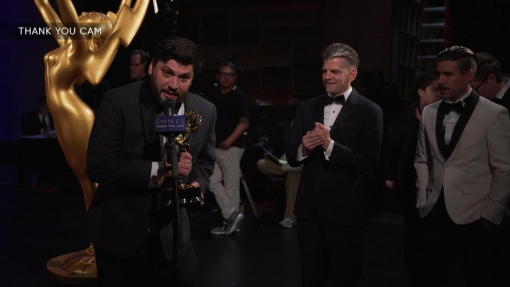Viewing Jonathan Van Ness's social media posts is like watching a kid in a candy store.
He's all smiles, snapping photos of every billboard with his picture on it, capturing press junket madness in selfies and Insta-Stories. As he chats on the phone from a curb in front of Equinox gym on the corner of Hollywood and Vine, his enthusiasm is infectious; he radiates the joy of someone who can't believe how far he's come and can't wait to get where he is going.
With an Emmy nomination under his belt for his Funny or Die web series Gay of Thrones and a successful podcast called Getting Curious, hairstylist Van Ness is now celebrating his new starring role on the Netflix series Queer Eye, a modern reboot of the Emmy-winning show Queer Eye for the Straight Guy.
Van Ness serves as the show's hair and grooming expert and self-care advocate. Along with his "Fab Five" counterparts, he strives to enhance the lives of straight (or closeted) men around the Atlanta, Georgia area. Unlike the show's predecessor, however, the new version of Queer Eye dives deeper into the backgrounds and beliefs of the LGBTQ community, of which Van Ness is an outspoken member and activist.
Following your social media, it's clear you're not shy when it comes to talking about your upbringing and the struggles you went through living in rural Illinois.
I was very flamboyant. I loved beauty pageants. I loved figure skating. I loved Vogue. I was just not your typical Midwestern little boy. I didn't have the same interests, and kids definitely didn't let me forget that. I was a really overweight kid, too, and I got teased about weight a lot. I got teased about my femininity a lot.
I can't tell you how many times someone would scream "Fag!" in my face. I got pushed down the stairs while I was being called a faggot. It really was relentless. I think it helped me have a sense of humor in my life, though, because they were so cruel, that if I didn't learn to laugh, I would've cried all the time. I think that's where I learned to be resilient.
So what was your path out of your hometown? How did you end up in California?
I always knew I wanted to do hair. I had one very bad semester of college - I think I had a 1.7 GPA -- and then I went to hair school in Minneapolis. I absolutely fell in love with doing hair.
Then I went to Arizona for a while. I was only 20; I was scared of LA and New York coming from a rural, Midwestern town, so I need to incubate in Arizona for a little bit. I built up a clientele there, and I learned what it was to work for myself. I realized after five years in Phoenix that I needed to grow.
I was still doing Kelly Clarkson highlights in 2009, when balayage and natural, lived-in color was really becoming a thing. I was like, "I don't know how to do this. I need to learn and grow. I need to get uncomfortable again." LA was the next natural step.
I moved here in August of 2009, and landed a dream job at Sally Hershberger. It was definitely a Devil Wears Prada experience. I think I cried every night for two years, but I learned so much about hair. I developed a clientele here and started to build.
It was one of those clients that led to Gay of Thrones, right?
Yes! Her name is Erin Gibson … I jokingly refer to her as the Usher to my Justin Bieber, because she introduced me to the entertainment industry. She's an incredible woman, comedian, and friend. I just can't even … she's changed my life so much. She is someone who is never paying for a haircut again!
It's just been this really fun merging of things I've been passionate about my whole life. It's grown a lot in five seasons, but basically Erin, myself, and a team of eight or nine of us watch an episode of Game of Thrones together and furiously take notes about jokes or gag ideas about the show.
Then we pee, powder my nose, come into the conference room, and bang out a script in an hour and a half. We script it and we write it, but we like to improv as well. We're in front of the camera by 9:00pm, and we usually wrap by 10:30 or 11:00pm, and then there's a furious editing frenzy. It's a fun day. It's a turn around of one day -- it's crazy.
You also have a podcast, Getting Curious, which you call your "passion project." You tackle a large variety of hard-hitting topics such as racism, women in the military, Armenian genocide, and Atlantic pirates. How did that come about?
Getting Curious honestly started because I am obsessed with the news, I love to read, and I realized from doing hair that I'm always getting new clients that know so many things that I wanted to learn about. From the time I was a child, I've just been so curious about things.
I wanted a bare, Annie Liebovitz-style podcast - just 30 minutes of conversation, no gimmicks - where you're hearing me learn in real-time. I'll always be a student, and I definitely want to keep doing it. It's not as flashy as some of the other things that I've done, but I really feel like it's from my brain right to the people who listen to it, without a lot of interference from anywhere else. I love that.
So, you were doing Gay of Thrones, and the podcast, and doing hair in your salon … how did you get involved with Queer Eye?
Last January, I read online that it was being rebooted. It was my favorite show during high school, and I just thought, "I really want to do this! I can see myself doing this." They were saying that the mission of the show was to turn a "red state" pink.
I come from Illinois, where everything is red outside of Chicago, and I was far southwest, on the Mississippi River across from Missouri. It was definitely red country, and I was like, "This just feels right up my alley."
I'm not an actor, and I don't know how to be an actor. I only know how to be myself. I also like to get to know people, and I love to be on camera, so this seemed like a perfect fit. I booked an audition, and oh my god, when I found out I got on it, I just like jumped up and down. I had heartburn for seven days. It was so exciting, and so surreal. All of it has been surreal.
The premise of Queer Eye is more about acceptance than tolerance this time around. What does that mean to you in the midst of how far the LGBTQ movement has come since the original show?
I feel like from 2003-2007 during the old show, that was a dark time for us. I feel like the thing that I remember from that era was at most, "I love you, but I can't agree with your lifestyle, because marriage is between a man and a woman." That, to me, is the difference between tolerance and acceptance.
Acceptance is, instead of being at a superficial level, seeing all of the facets of LGBTQ people and being open to them. Seeing that some gay men don't know the first thing about a good haircut. The borders, the boundaries and those means to define people have simmered down a bit, which I think is beautiful.
People just need to accept! There are so many different shapes, sizes, creeds, backgrounds, colors, and pasts. Everyone is beautiful, and everyone has something to offer.
Was acceptance a hard sell in Atlanta?
Downtown Atlanta felt like a cute, urban city. It's geographically interesting, though, because if you go like three miles away from there, it's an entirely different voting population. We went to more rural places, and it just felt like going back home, but hotter. Atlanta's like 98% humidity in the summer, so there was a little bit more frizz, and a lot more sweat.
I didn't really feel like a fish out of water - I felt like a fish back in the water, scaring people with my propensity to hold other boys' hands, skip, and sing really loudly in public.
The show allowed for a dialogue, though. It allowed people who may not agree, who couldn't see eye to eye, to be in a safe space to have that dialogue and let a conversation finish rather than storming off in the middle. It was a two-way street.
With Queer Eye now on Netflix, and Gay of Thrones nominated for an Emmy for "Outstanding Short Form Variety Series," do you consider yourself more of a hairstylist, or an entertainer?
It depends on the day. If there's a camera in front of me, I'm an entertainer and a comedian. If I'm in the salon, I'm a hairdresser. I still do hair three days a week at my little studio with my bestie in Brentwood. There's a lot of other stuff I want to do, but I definitely always want to keep doing hair. I actually literally love it. I get kind of sad when my fingers don't get dirty in hair color.
Are there any other big goals you have? More seasons of Queer Eye?
I hope! Your lips to God's ears! But really, I just want to keep learning. I want to keep creating. I want to keep growing.
I've started going back and forth between New York and LA a lot. I really love New York - I feel like it teaches me and pushes me like I first felt when I moved to LA. I want to get uncomfortable and grow again.
I'd love to be able to afford an apartment in New York and LA, and be bicoastal, and keep growing with the hair stuff - do a major Garnier campaign ad or something. Until then, I'm really just focused on this amazing opportunity, and everything else on my plate. I'm just trying to do the best that I can.

